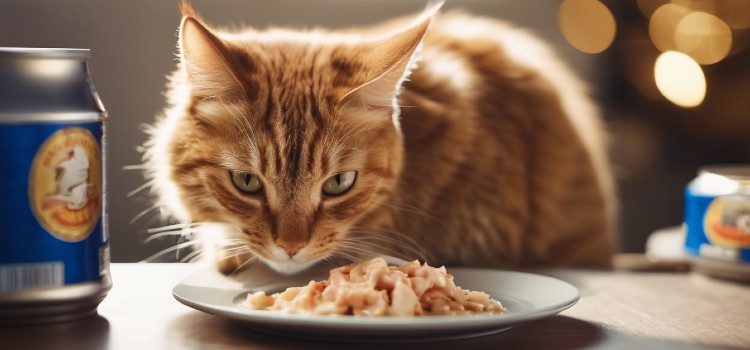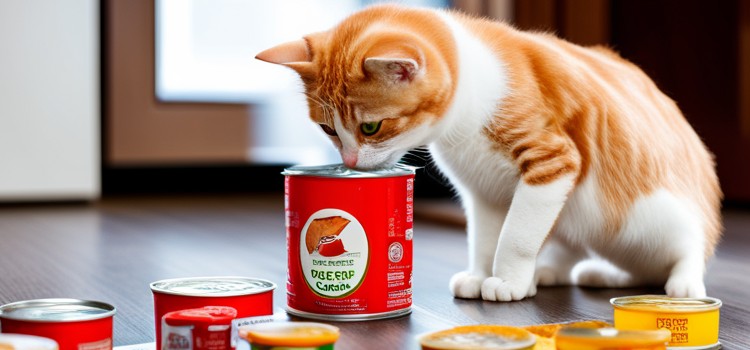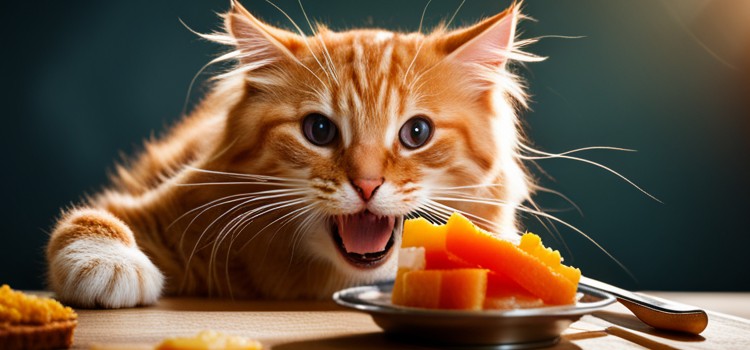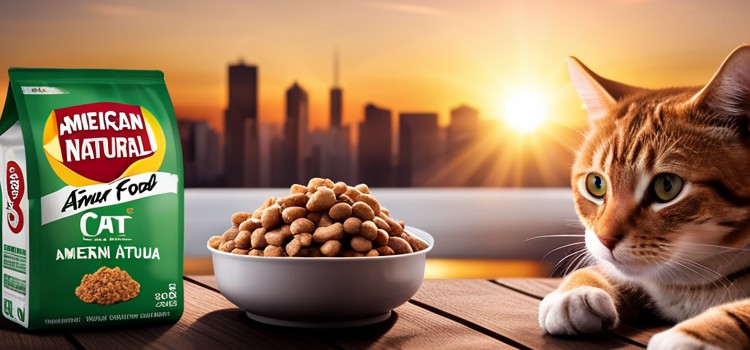As an Amazon Associate committed to the mission of improving the lives of our readers, Live-Clear.com receives a small commission from eligible purchases made through our affiliate links. This revenue enables us to keep producing insightful articles and other material.
Yes, cats can eat canned chicken breast as a part of their balanced diet. Canned chicken breast is safe and healthy for cats to eat in moderation as it is a source of protein and essential nutrients.
However, cat owners should ensure that the chicken is plain, cooked, boneless, and free from any seasoning or additives that may be harmful to cats. It is important to note that canned chicken is not a complete substitute for a cat’s regular cat food as it lacks the necessary vitamins and minerals.

Therefore, it should only be given as an occasional treat or as a complement to their regular diet. Consulting with a veterinarian is recommended to determine the appropriate amount and frequency of feeding canned chicken to cats.
Health Benefits Of Canned Chicken Breast
When it comes to the health benefits of canned chicken breast for cats, there are several important factors to consider.
High Protein Content
Canned chicken breast is packed with high protein content, making it an excellent addition to your feline friend’s diet. Protein is essential for cats as it helps in building and repairing tissues, supporting lean muscle development, and boosting their overall immune system. This nutrient is particularly important for cats as they are obligate carnivores, meaning they require a diet rich in animal-based protein.
Good Source Of Essential Nutrients
Not only is canned chicken breast a great source of protein, but it also provides essential nutrients that contribute to your cat’s overall health and well-being. This lean meat contains vital vitamins and minerals such as:
| Vitamins | Minerals |
|---|---|
| Vitamin B6 | Zinc |
| Vitamin B12 | Selenium |
| Vitamin D | Iron |
| Vitamin E | Phosphorus |
These nutrients play a crucial role in maintaining your cat’s overall health, aiding in digestion, promoting a healthy coat and skin, and supporting cognitive function.
However, it’s important to keep in mind that while canned chicken breast can provide various health benefits for cats, it should always be given in moderation. Talk to your veterinarian to determine the appropriate amount to incorporate into your cat’s diet, considering their individual needs and any existing health conditions.
Feeding Canned Chicken Breast To Cats
Cats can safely enjoy canned chicken breast as part of their diet, providing them with a high-protein meal option. It is essential, however, to ensure that the chicken is free from any added salts, spices, or seasonings that may harm their health.
Introducing Canned Chicken Breast In Moderation
Feeding canned chicken breast to cats can be a convenient and tasty alternative to traditional pet food. However, it’s essential to consider a few factors before including it in your furry friend’s diet. When introducing new foods, consulting with a veterinarian is crucial in ensuring your cat’s health and well-being.
Consulting With A Veterinarian
Consult with a veterinarian is essential before incorporating canned chicken breast into your cat’s diet. Your veterinarian can provide valuable insights and guidance based on your cat’s needs. They can assess your cat’s overall health, dietary requirements, and potential allergies or digestive issues. Proper consultation with a veterinarian can help you determine the appropriate amount of canned chicken breast to feed your cat and the feeding frequency. Veterinarians can advise on suitable cat food brands offering balanced nutrition and essential vitamins and minerals. Remember that a feline’s dietary needs may differ from those of humans, so seeking professional advice is essential.

Introducing Canned Chicken Breast In Moderation
When introducing canned chicken breast to your cat, it is important to do so in moderation. While cats are obligate carnivores and require meat in their diet, a balanced diet also consists of other nutrients. Incorporating canned chicken breast and a complete and balanced cat food diet is crucial for providing the necessary nutritional requirements.
To ensure your cat receives all the essential nutrients, consider mixing a small canned chicken breast with their regular cat food. This gradual introduction can help their digestive system adjust and minimize the likelihood of any adverse reactions. Additionally, monitor your cat’s response to canned chicken breast. Watch for any signs of gastrointestinal distress, such as vomiting or diarrhea.
If your cat displays any adverse reactions, it may be necessary to discontinue feeding canned chicken breast and consult with your veterinarian. Treats like canned chicken breast should only comprise a small portion of your cat’s diet. It’s essential to provide a balanced and complete cat food that meets all their nutritional needs.
Feeding your feline friend canned chicken breast can be a nutritious and delicious addition to their diet. However, it’s crucial to consult with a veterinarian and introduce it in moderation to ensure your cat’s health and well-being. Taking these precautions allows you to safely treat your cat to some canned chicken breast without compromising their nutritional requirements.
Nutritional Considerations
Cats can safely consume canned chicken breast as part of their diet if it is appropriately balanced with their nutritional needs. It is important to consult with a veterinarian to ensure that the cat’s nutritional requirements are met.
Avoiding Flavored Or Seasoned Varieties
When it comes to your feline friend’s overall health and well-being, it is essential to consider their nutritional needs. While cats are obligate carnivores, meaning they require a diet primarily consisting of meat, ensuring that the food they consume provides the necessary nutrients for a balanced diet is crucial.
Checking The Ingredients List In Canned Chicken Breast
When choosing canned chicken breast for your cat, you must check the ingredients list carefully. Look for products that only contain chicken breast as the primary ingredient. Ensure there are no artificial flavors, preservatives, or fillers that might negatively impact your cat’s health. Opting for products labeled as ‘100% natural’ or ‘grain-free’ can offer a higher quality option for your feline companion.
Avoiding Flavored In Canned Chicken Breast
While flavored or seasoned canned chicken breast may seem enticing, avoiding such varieties when feeding your cat is best. These products often contain additional ingredients like onions, garlic, or spices, which can harm cats. Some seasonings, like onion and garlic, can be toxic to felines and may lead to serious health issues such as anemia. Sticking to plain, unseasoned chicken breast is always safer to ensure your cat’s nutritional needs are met without any potential harm.
In summary, when offering canned chicken breast to your cat, keep their nutritional needs in mind. Be sure to check the ingredients list for additives or fillers and opt for plain, unseasoned varieties to avoid potential harm. Providing your feline friend a balanced diet will improve their health and happiness.

Potential Risks And Concerns
While cats can eat canned chicken breast as a treat, it’s important to be aware of potential risks and concerns. Feeding cats exclusively with canned chicken breast can lead to nutritional imbalances and lack of essential nutrients. Consult with a veterinarian to ensure a balanced diet for your feline friend.
While canned chicken breast may seem like a convenient option to incorporate into your cat’s diet, it’s important to be aware of the potential risks and concerns associated with feeding it to your feline friend. Let’s take a closer look at two key aspects:
Sodium Content
Sodium is an essential mineral that plays a vital role in various bodily functions. However, too much sodium can be harmful to cats, just as it can be for humans. Canned chicken breast often contains added salt to enhance flavor, and this can lead to an excessive sodium intake for your furry companion. High sodium levels may contribute to the development of conditions such as hypertension and kidney problems in cats.
It’s important to note that cats have a much lower tolerance for sodium compared to humans. Therefore, it is crucial to moderate your cat’s sodium intake to prevent any potential health issues. If you decide to feed your cat canned chicken breast, make sure to read the labels carefully and select varieties with low sodium content. Additionally, consult with your veterinarian to determine the appropriate amount of sodium in your cat’s diet to ensure their overall well-being.
Added Preservatives
Canned chicken breast often contains added preservatives to increase its shelf life and prevent bacterial growth. While these preservatives are generally considered safe for human consumption, they may pose potential risks for cats.
Certain preservatives, such as sulfites, can be toxic to cats, causing adverse reactions, including gastrointestinal upset and allergic reactions. Additionally, some preservatives, such as sodium nitrate, have been associated with an increased risk of certain health conditions in cats.
When considering feeding your cat canned chicken breast, be mindful of the preservatives used in the product. Opt for brands that use natural preservatives or formulated explicitly for feline diets. Doing so can help minimize potential risks and prioritize your cat’s health.
Alternatives To Cats Eat Canned Chicken Breast
When it comes to feeding your cat, it’s important to provide them with a balanced and nutritious diet. While canned chicken breast may seem convenient, some alternatives can offer your feline friend even more benefits. Here are two alternatives that you can consider:
Cooked Chicken Without Additives
One of the simplest alternatives to canned chicken breast is cooking chicken at home. Doing so ensures your cat gets high-quality protein without unwanted additives or preservatives. Boil or bake boneless, skinless chicken breast and shred it into small pieces. This will provide your cat with a tasty and wholesome meal that is easy to digest. Remember to remove any bones, as they can pose a choking hazard.
Commercially Prepared Cat Food
If you’re looking for a hassle-free option that provides your cat with a balanced diet, commercially prepared cat food is a great choice. These specially formulated cat foods meet your cat’s nutritional needs. They come in various flavors and textures to appeal to their taste buds. Look for brands that prioritize real meat as the main ingredient and avoid those that contain fillers such as grains or artificial additives. Reading the labels carefully can help you make an informed decision and select the best option for your feline companion.
Preparing Canned Chicken Breast For Cats
Feeding your cat a balanced and nutritious diet is essential for their health and well-being. While cats are obligate carnivores, it’s crucial to offer them a variety of protein sources. One such option is canned chicken breast, which can provide a convenient and tasty addition to their meals. However, before serving this delectable treat to your feline friend, it’s essential to prepare it properly. This section will discuss the steps to take when preparing canned chicken breast for cats, ensuring a safe and enjoyable dining experience for your beloved pet.
Draining Excess Liquid
When you open a can of chicken breast, you may notice an excess amount of liquid. This liquid, often called brine, can contain added salt and other preservatives that may not suit cats. It is crucial to drain this liquid before offering the chicken to your feline friend. To do so, follow these simple steps:
- Hold the opened can over a sink or a bowl.
- Gently tilt the can to pour out the excess liquid.
- You can give the can a light shake to remove any remaining liquid.
- After draining the liquid, move the chicken to a different clean bowl for the next step.
Shredding The Canned Chicken Breast Into Small Pieces
With the removal of excess liquid, it’s time for you to prepare the chicken for your cat. Shredding the chicken into small, easily manageable pieces will make it more palatable and accessible. Follow these steps to shred the chicken:
- Using a fork or your fingers, gently pull the chicken apart into small, bite-sized pieces.
- Make sure to eliminate any large chunks, as they may present a choking hazard to your cat.
- If your cat has dental issues, shred the chicken into smaller, more manageable pieces.
- After shredding the chicken, blend it with your cat’s regular food or offer it as a standalone treat.
Remember, while canned chicken breast can be a healthy addition to your cat’s diet, it should not replace their regular meals. Offer it in moderation and include it as part of a well-balanced diet featuring a variety of protein sources. By following these simple steps, you can ensure that your cat enjoys a tasty and safe meal that satisfies their natural carnivorous cravings.

Conclusion
Canned chicken breast can be a safe and convenient option for cats, but moderation is key. While it provides essential protein, necessary for feline health, it should never replace a balanced diet. It is important to consult with a veterinarian before introducing any new food into your cat’s diet.
Frequently Asked Questions On Can Cats Eat Canned Chicken Breast
Yes, cats can eat canned chicken as it provides a good source of lean protein. Moderate and treat your cat with hot chips; refrain from making it a primary meal. Choose canned chicken without any added spices, seasonings, or ingredients that could harm cats.
Yes, canned tuna and chicken can be suitable for cats in moderation. It provides a source of protein, but it should not be their primary food. Ensure it is plain and doesn’t contain any added seasonings or sauces.
Cats can’t eat cooked chicken because it lacks essential nutrients for their well-being. Raw chicken provides them with vital enzymes and moisture.
The best meat for cats is lean, unseasoned, cooked chicken or turkey. It provides high-quality protein and essential nutrients for their overall health and well-being.
Cats can eat small amounts of plain, boneless, and skinless canned chicken breast as an occasional treat.
Remember, your furry friend’s well-being is always a top priority!
Amazon and the Amazon logo are trademarks of Amazon.com, Inc, or its affiliates.



